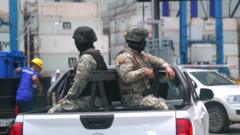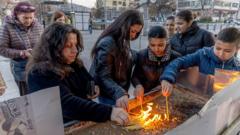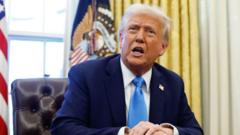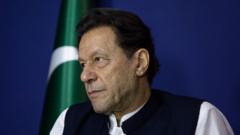French authorities investigate the recent surge of violent attacks on prisons, with strong indications pointing towards drug gangs in response to new anti-trafficking laws. The Interior Minister asserts that the government has declared war on these criminal organizations, leading to heightened security measures and a crackdown on their operations.
French Prisons Under Siege: Drug Gangs Suspected in Coordinated Attacks
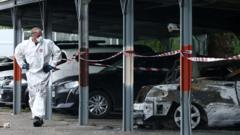
French Prisons Under Siege: Drug Gangs Suspected in Coordinated Attacks
A series of arson and gun attacks on French prisons has prompted speculation about the involvement of drug gangs in retaliation against government crackdowns.
French prisons have recently experienced a wave of violent attacks that are raising alarms across the nation. Following a series of arson and gunfire incidents, police have opened investigations but, as officials state, all lines of inquiry remain on the table. Speculations have arisen regarding potential involvement from the extremist left or foreign adversaries, with countries like Russia and Algeria mentioned. However, the rising consensus suggests these 12 attacks since Sunday are orchestrated by drug gangs retaliating against the French government's intensified crackdown on drug trafficking.
As stated by Interior Minister Bruno Retailleau, the ongoing governmental efforts have been a catalyst for the violence, portraying an image of the gangs as "drugs-yobs" engaging in a war against state authorities. The coordinated nature of the attacks, occurring over three nights and involving assaults on prison officers' vehicles and property, points to organized criminal activity. Notably, graffiti was found at the attack sites promoting a group dubbed DDPF, which stands for "Droits des Prisonniers Français," or "Rights for French Prison Inmates."
The scant credibility of this faction has led experts to regard it as an unconventional representation of drug gangs, who typically do not position themselves as advocates for prisoners' rights. While the group claims to defend basic human rights, its linguistic errors in a released video hint at a lack of genuine political conviction, suggesting a desperation to frame their violence as righteous.
Despite the speculative theories of foreign influence or leftist militants, police investigators focus on the compelling theory of drug gang involvement due to their established capability and motivation. Both the Interior and Justice Ministers seem unified in their promise to dismantle drug operations through a pending law that provides enhanced powers for investigators and creates a dedicated prosecutorial branch targeting drug trafficking.
This proposed legislation aims to restrict communication channels for incarcerated gang leaders by reforming prison policies and creating top-security facilities designed for the worst offenders. The precedent for severe retaliation by the gangs, as highlighted by the previous escape of drug lord Mohamed Amra, who led a deadly attack against prison staff, underscores the urgency for government reforms.
The recent prison attacks may signal that, for the first time, drug gangs feel threatened, prompting their violent response. If the government can capture one of the attackers, it may further validate their aggressive stance on combating the drug trade, a pivotal element leading into future electoral politics.



